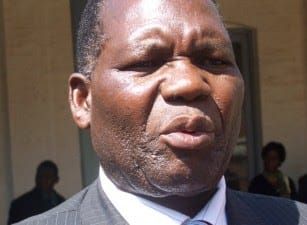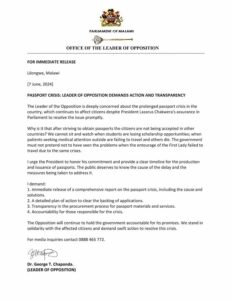By Burnett Munthali
In a significant move highlighting the challenges facing Malawi, Dr. George Chaponda, the recently appointed Leader of the Opposition, has brought attention to the ongoing passport crisis that has plagued the country. Speaking out on the issue, Chaponda criticized the government’s handling of passport issuance, describing the situation as a severe administrative failure that is affecting thousands of Malawians.
Chaponda, who took over the opposition leadership following Kondwani Nankhumwa’s resignation, has swiftly positioned himself as a vocal critic of the current administration. He asserts that the passport shortage is not just an inconvenience but a critical failure that hampers citizens’ ability to travel for personal, educational, and business purposes. This crisis, according to Chaponda, reflects broader systemic inefficiencies within the government’s operations.

“The inability of the government to ensure the availability of passports is a clear indication of its administrative incompetence,” Chaponda stated. He pointed out that many Malawians have been unable to travel or conduct business abroad, causing economic setbacks and personal distress. The delays in passport issuance have led to long waiting periods, with some applicants waiting for months without receiving their documents.
Chaponda’s remarks come at a time when the Democratic Progressive Party (DPP) is seeking to rejuvenate its role in parliament. The party, which has faced internal conflicts and leadership changes, sees Chaponda’s appointment as a strategic move to strengthen its opposition stance and enhance its capacity to hold the government accountable.
In addressing the passport crisis, Chaponda has called for immediate government intervention to resolve the backlog and streamline the issuance process. He argues that the resolution of this issue is critical for restoring public confidence in the government’s ability to manage essential services effectively. “We need a government that can meet the basic needs of its citizens, and the issuance of passports is a fundamental service that should not be in disarray,” Chaponda emphasized.
Chaponda’s leadership is expected to bring a more robust and dynamic opposition in Malawi’s parliament. His experience and assertive approach are seen as vital in challenging the ruling party’s dominance and advocating for the needs of ordinary Malawians. The DPP has defended his appointment amid some criticisms, particularly from gender activists who felt that the previous acting leader, Mary Navicha, was capable and should have continued in the role.
As Chaponda takes on this new role, his focus on critical issues like the passport crisis sets the tone for what could be a more engaged and proactive opposition. His efforts to address such pressing matters underline his commitment to ensuring that the government is responsive to the needs of its citizens.



